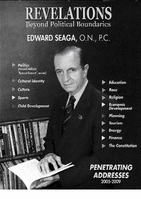
Title: Revelations Beyond Political Boundaries
Author: Edward Seaga
Reviewer: A. W. Sangster
The book Revelations Beyond Political Boun-daries, published by the Edward Seaga Research Institute, is a compilation of 29 penetrating addresses, including two book launchings, given over a period of several years to widely differing audiences. The cover lists 14 topics as some of the addresses cover similar ground. The time spent in public life as Jamaica's fifth prime Minister and the Caribbean's longest serving parlia-mentarian (45 years) provides the background for the extensive variety in the material covered in the book and enables the author to speak with authority on the wide range of topics that he has selected, ranging from politics, culture, education, finance, the constitution and more.
The title, Revelations, will probably raise queries as the Oxford Dictionary defines the term as: "Disclosure of knowledge to humankind by a divine or supernatural agency". Was Mr Seaga going divine? This might be an initial thought, for those who know Seaga will recall his wry sense of humour and his capacity to use the turn of phrase to invoke spiritual meanings in the heat of political battle. Recall: The prophetic warning on the Clash of the Sevens, and the challenge he threw down that Michael Manley had lost his Rod of Correction! But we need not worry about the divine in the title, as Beyond Political Boundaries, the sub-title, is clearly the restrictive parameter.
reasoned position
All the lectures clearly articulate a reasoned position, each on a topic that will generate interest among a wide circle of readers. A good example is the first address. It was his farewell address in Parliament as he ended his parliamentary career. Seaga used an updated version of the topic - 'The Haves and Have-Nots'. In the chapter, Seaga examines three important functions which any system of good governance ought to perform for the benefit for its citizens. They are:
The provision of a fair and secure criminal justice system;
The operation of an efficient educational system;
The creation of an economy which provides sufficient gainful opportunities.
In looking at all of these basic provisions of governance, Seaga argued that there had been a serious decline in the quality of the services offered.
Several of the addresses speak about cultural matters - which he says is his first love. You will find addresses on: The Folk Roots of Jamaican Cultural Identity; The Origins of Jamaican Folk Music; Broadening the Base of Art and Life on a Cultural Mission. They represent his grasp of the subject and list, too, his extensive personal involvement in the identification with and the preservation of our Jamaican culture. His support for artist, 'Kapo', the identification and preservation of Devon House and Olive Lewin's Memory Bank are just snippets of his deep, personal involvement in the real Jamaica.
Several of the addresses deal with financial matters, such as Boosting Pensions, The Paralysis of High Interest Rates, Saving is where it all Begins; Tourism is the Driver in the Jamaican Economy; Pursuing a new Growth Strategy and The CARICOM Single Market, Beneficial Path or Wayward Journey.
The broad grasp of the issues covered in these addresses gives the reader real insights on the issues being addressed. In some cases, Seaga reveals behind the scenes initiatives on his part to achieve specific goals. One example is his address to overseas financial interests on the need for greater Jamaican participation in the economic life of the country. This eventually led to the development of indigenous banking and insurance institutions. The data that accompany many of the addresses represent the clear, analytical thinking that made him such a successful finance minister.
development
Seaga's address on The Sweeping Benefit of Sports gives important insights on the value of sports, not only as an agency of community and national development, but also its role as an agent in youth deve-lopment. His role in the development of sports in Tivoli Gardens and his later role as president of the developing National Premier Football League are testimony to his understanding of the thesis he articulates.
We may well call Seaga the 'Idea Man' for in the final chapter he states:"It is a profound thesis that it is impossible ultimately to keep the human mind in chains. It may be argued indeed, that most of the advances in human society, in human civilization, in human history, spring from this ineluctable fact".
The book gives many insights and ideas behind the work and service of this outstanding Jamaican and will provide great reading to upcoming generations in our schools and colleges.